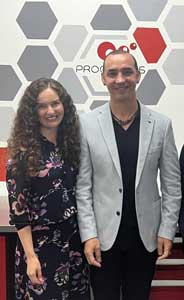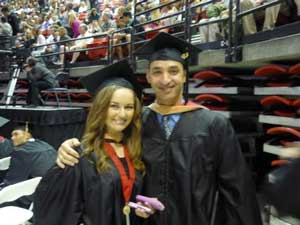Fowler Master’s Alumni Power Genetic Science Advancement
 Open the image full screen.
Open the image full screen.
Progenesis was founded by Nabil Arrach, (’10, MBA) who began working in San Diego’s biotech industry in 2005 after completing a postdoctoral fellowship at the University of California, Berkeley. Arrach, who had become interested in establishing his own company while he was pursuing his Ph.D., found the environment in San Diego ripe for a biotech start-up, however, he wanted to gain the business skills needed for entrepreneurial success. His search for the right MBA program led him to San Diego State University’s Fowler College of Business.
“SDSU has a good reputation as a school for entrepreneurship,” said Arrach. “I chose to get my MBA from SDSU because I wanted to learn how to run a business from other entrepreneurs and learn more about doing business on an international scale.”
During one of his international business classes, he met Sandra Valverde, who was in the process of earning her Master of Science in Business Administration (MSBA) degree. Valverde had earned her bachelor’s degree in finance from Fowler a year earlier but returned to SDSU to earn her graduate degree after taking a full-time position in human resources (HR).
“I started working in the human resources department when I was a teenager at SeaWorld. I loved providing people with career opportunities and seeing the delight in their faces when they got a job offer,” said Valverde, a San Diego native. “I came back to SDSU to get my master’s degree when they expanded their HR curriculum.”
After working on several group projects together at SDSU, Valverde and Arrach became friends and stayed in touch even after both earned their degrees in 2010. Valverde began working in the private sector with increasingly higher levels of HR management responsibility, while Arrach obtained his first National Institute of Health grant and became a project scientist at University of California, Irvine’s School of Medicine.
In 2013, Arrach decided to live his dream by becoming an entrepreneur. He returned to San Diego and co-founded his first genetics diagnostic company, which he operated for a little over a year. He founded his second company, Progenesis, in 2015 after seeing an opportunity to help prospective IVF patients by screening their embryos for genetic disorders such as cystic fibrosis, sickle cell anemia and Tay-Sachs disease prior to implantation.
As the company grew both locally and internationally, Arrach realized the need to bring in an HR professional who could help “redefine the company by working with a global team as we expanded our reach of reproductive genetics,” he said. With that in mind, he reached out to Valverde to join Progenesis, but she didn’t accept the position right away.
“Before I joined the team, I had to study Progenesis and learn about the company first,” she said. “When I learned their mission was to provide accurate genetic testing to help build healthy families, this aligned with my values.”
Valverde joined Arrach and Progenesis in December 2022, and since then, the two of them have created over 30 new positions on a global basis, several of which have been filled by SDSU alumni. In addition to employees at the San Diego-based headquarters, the company currently also has locations in Brazil, India, Turkey, and Panama with a location to be opened in Japan in the coming months. “We have seen a greater need to bring the latest technology to other countries where reproductive options are limited,” said Arrach.
 Open the image full screen.
Open the image full screen.
Valverde added to his sentiment by saying: “SDSU taught me that having a strong work ethic is the most important attribute a person can offer. That was the key to successful group projects at SDSU. It was a lesson I transferred to the work environment that I’m still using today.”

